Peter MALONE
Saturday, 18 September 2021 19:20
Sun Valley Serenade
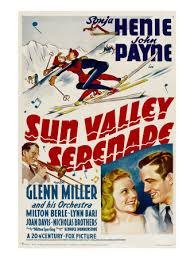
SUN VALLEY SERENADE
US, 1941, 86 minutes, Black and white.
Sonja Henie, Glenn Miller and his Orchestra, John Payne, Milton Berle, Lynn Bari, Joan Davis, The Nicholas
Brothers, Dorothy Dandridge.
Directed by H. Bruce Humberstone.
Sun Valley Serenade is old-fashioned 20th. Century Fox musical comedy. However, allowing for the period, it is still quite lively entertainment.
It is a star vehicle for Sonja Henie who is a lively comedienne and, of course, noted for her skating routines - which, in the way that Esther Williams was popular with swimming sequences, are very enjoyable and visually impressive. John Payne, a regular hero at 20th. Century Fox in those days, is John Payne as usual. However, his sidekick is played by Milton Berle in a humorous self-mocking way. Glenn Miller and his Orchestra appear as a band - and have the opportunity to play their music. (They were to appear at the same time in Fox's Orchestra Wives.) There is a small comedy routine by Joan Davis. Dorothy Dandridge appears briefly as a singer and the Nicholas Brothers (also in Orchestra Wives) are excellent in their dance routines.
The film was directed by H. Bruce Humberstone, a veteran of this kind of musical. Songs, including 'Chattanooga Choo Choo' (by Harry Warren and Mack Gordon) are part of the musical score by Emil Newman which was Oscar-nominated as was the photography by Edward Cronjager. Lynn Bari has the role of 'the other woman'.
The film has the usual themes of the show business group trying to get on, innocent romance with the immigrant falling for the bandleader at the expense of the other woman.
Published in Movie Reviews
Published in
Movie Reviews
Tagged under
Saturday, 18 September 2021 19:20
Sunshine

SUNSHINE
US, 1973, 103 minutes, Colour.
Christina Raines, Cliff De Young, Brenda Vaccaro.
Directed by Joseph Sargent.
Sunshine was made for American television screening. It was shown in Australian theatres with great success. It seems to have appealed to audiences tired of trends of violence. The film is based on true events, on tapes made by a dying girl as some means of living on after her death and as something to bequeath to her daughter. The film is reminiscent of Love Story in tone and in some of its themes, but it is stronger in its dealing with illness and death as well as in emotional conflicts caused by the moodiness consequent upon illness. John Denver's popular music is featured.
1 The irony of the name of this film? The song and its overtones? The happiness in sadness? The atmosphere of sunshine? The picture of real events and real persons?
2. The human interest, especially for feminine audiences, identifying with Kate? How sad was the film? What atmosphere did the songs add, especially the 'Sunshine' song, and the song at O'Briens? The use of 'Country Road' at the funeral?
3. The film was structured into flashbacks: the funeral was first, then the reminiscence. How effective dramatically was this? Would the film have been better if it had moved forward chronologically? Why?
4. The use of the tapes: the fact that this was true, the heritage of the tapes, the way of communicating the feelings of the dying person? How impressive was this? How important was the world in which Kate and Sam lived? The atmosphere of drop-outs from modern society, of their doing their own thing, yet finding a place in the real world of hotels, shops, and hospitals? How does this help younger modern audiences to relate to the characters and to the film?
5. How attractive a personality was Kate? The fact that we knew that she had died and she was dying during the film? The call on our sympathies and emotions? Was her background sufficiently filled in? Her relationship with her mother, her leaving home, the lack of love between mother and daughter? The nature of her marriage and its lovelessness? The importance she gave to carrying the child and not aborting it?
6. The lack of relationship with the child's father? Her dependence on Sam and his goodness to her? The way that she faced-up to her illness? Her relying on the treatments and then her rebelling against them? The fact that she could love and hate at the same time?
7. The joy in giving birth to Jill and her bringing-up of Jill? The joy of the wedding in hospital? The boost that taping her experiences gave her? Her dependence on the doctor? The quality of her dying? The way that she brought some sunshine into other peoples lives? How much of a modern heroine was she? How impressive was the film in its treatment of themes of life and death, of youth and aging, of peace and rebellion?
8. How did the film show immortality as a basic drive in mankind? The fact that Kate wanted to make a mark in her world? The heritage of her spirit for her child? What is the meaning of this basic drive not to die?
9. How attractive a personality was Sam? How much nobility in his marrying Kate and his caring for Jill? His weaknesses and the affair with Nora? The exasperation at Kate's love and hate? His need for his own achievement in his music? The importance of the achievement at O'Briens? How real was his rebellion against Kate and her refusal of medication? How complex a person was Sam and how realistic was this presentation?
10. How attractive a friend was Nora? Her love for Kate and Sam? For Jill? Would she look after Jill well?
11. The importance of Kate's cousins and friends, the musicians, the people with whom she moved? The friendship she gave them and the joy that it gave to her? The support she had from the doctor? The friendship she got from the doctor, especially in her death?
12. The hospital atmosphere and modern medicine? The need for money, the need for patience, the need for research?
13. The final image was of Jill? What was the purpose of this?
Published in Movie Reviews
Published in
Movie Reviews
Tagged under
Saturday, 18 September 2021 19:20
Supercops, The
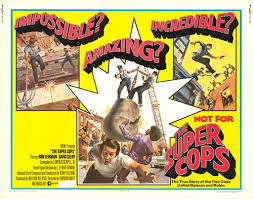
THE SUPERCOPS
US, 1973, 94 minutes, Colour.
Ron Leibman, David Selby, Sheila E. Frazier, Pat Hingle, Dan Frazer.
Directed by Gordon Parks Jr.
The Supercops is a small, compact film that is half-brother to Serpico and suffered at the box-office because of this. Hantz and Greenberg, the heroes, are as relentless as Serpico, but have a cavalier derring-do approach to their work - they have to be stalking and catching criminals even in their spare time. They were nick-named Batman and Robin and their apparently true-to-life story is packed full of almost comic-book action. Lithe and short Ron Leibman gives a frenziedly enthusiastic performance. David Selby is tall and bland by comparison. Action-packed, stunts well-staged, it should certainly satisfy fans of crime films and the early 70s police genre.
1. The meaning and tone of the title? Audience expectations for this film? The style of the film and its impact? How well were expectations fulfilled?
2. Was this satisfying police drama? How good was it as a film? The human interest, the action-sequences, the documentary realism?
3. Comment on the use of locations, the colour-photography, the authentic atmosphere of New York, the details of the action-sequences and the continued movement in the film.
4. What was the main impression about America, society, crime, gangsters and their influence and hold, the police, their integrity and their corruption? Did the issues in the film seem authentic or not?
5. What evaluation of police and their work did the film make? What was audience response to police work and its dangers?
6. Comment on the structure of the film: the realistic opening with the real policemen, the reprise of the sequence in the end? The irony of the two sequences when the reality was filled in during the film?
7. How important was the documentary tone of the film: the initial training, the police work, traffic, the officers, the men, the buildings, the dangers and difficulties? Did this add to the film's impression?
8. How do you explain these men in themselves? Were they sympathetic characters? Interesting characters? Could the audience identify with them? Who was the major influence of the two? How strong a personality was Greenberg? So small, his dynamism , his tip-toeing at the beginning, sleeping during class, asking questions, joking, his intense sense of humour? How strong were his ambitions? How serious was he? His qualities as a leader? His influence on Hantz? How placid a man was Hantz, a follower? If he was not friends with Greenberg would he have done the same things? Would Greenberg have done the same things by himself? The strength of their friendship? What drove them? Achievement, combating evil, a sense of right, doing their duty, an obsession?
9. How well did the film illustrate their work? For example, the pusher on Coney Island, the scaling of the building, the sniper, escaping on the wreckers' crashing ball, the encounters with the Hayes brothers?
10. How interesting were the details of official reaction to their work? The ploys officialdom made to thwart them?
11. The irony and humour of their going to the traffic, their work in the courts and the hold-ups, their transfers?
12. The sympathetic official: his fear about bugging, his testing them by the phone call, his continued support? How did he stand out against the other officials?
13. The role of the prostitute in the film? The background of her life, her apartment, Greenberg's assassination? Why did she consent to give contacts and information?
14. The drama of the encounter with the Hayes brothers and the agreement for the drive? The bargaining about the money and the Hayes' expectations of the police? The danger, the finding out of the truth and the murder attempt? Lack of support from the police?
15. How important as a finale was the sequence in the restaurant and the mutual tape-recording? What did this reveal about police methods and corruption?
16. The irony of the ending and their reward for duty? The vales of this film? A good film?
Published in Movie Reviews
Published in
Movie Reviews
Tagged under
Saturday, 18 September 2021 19:20
Sunshine Patriot, The
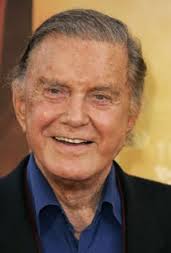
THE SUNSHINE PATRIOT
US, 1968, 90 minutes, Colour.
Cliff Robertson, Dina Merrill, Luther Adler, Wilfrid Hyde- Whyte, Lilia Skala.
Directed by Joseph Sargent.
The Sunshine Patriot is a feature movie made for T.V. and certainly one of the better ones. It is a spy story which raises many questions, but especially in regard to mistaken identity and freedom and the suffering that endures. For these reasons it is worth catching. Cliff Robertson plays two roles and plays them well giving credibility to a contrived situation. Luther Adler as the chief of the secret police (and an expectant grandfather) is excellent.
1. Was this an interesting espionage film? Why?
2. How did the London sequences and the discussions there set a tone to the film? How impersonal and callous were the British controllers? Could they afford any real feelings? Was the inclusion of Ross's fiancee. her planning marriage and a home after his last mission, effective or sentimental?
3. There is some discussion about 'realism', 'worry towers', 'the nitty gritty'. Is the world of espionage real? Realistic?
4. What kind of man was Ross? Were you shocked when he killed the Professor? Why?
5. How smart was Ross in changing places with Selby? Was this plausibly done? How? or was this too far-fetched? How did Ross handle the uncertainties of the situation?(Cliff Robertson looked and spoke differently in his two roles. How effective was this technique of his playing both parts?).
6. What impression did the European intelligence people make? How did they compare with the British? Who were more ruthless? What was the point of all the talk about Hyneck's grandchild? How did this humanise them? How did Benedict contrast with Hyneck? The lady doctor?
7. How thorough were the Europeans? How cruel? How gullible? Did they have the right to torture Selby? Did they do their best to identify him?
8. What were your feelings about the torture and suffering of Selby? Were you sympathetic with Ross and his mission? Did you hope he would succeed? Did he have the right to let Selby suffer? Did he have any feelings for Selby?
9. Why did Francie go along with Ross's plans? Should she?
10. Why did Hyneck eventually believe Selby? (How callous were the British in delaying his identification? Did they have the right?).
11. Was it inevitable that Ross be killed?
12. Was the secret material worth the lives and suffering of those involved? -secrets that would be written up in scientific journals, material that subordinates did not know was contained in it or where it was?
13. What was the final comment and judgement on espionage?
Published in Movie Reviews
Published in
Movie Reviews
Tagged under
Saturday, 18 September 2021 19:20
Sunshine Boys, The/ 1975

THE SUNSHINE BOYS
US, 1975, 111 minutes, Colour.
Walter Matthau, George Burns, Richard Benjamin, Lee Meredith, Carol Arthur.
Directed by Herbert Ross.
The Sunshine Boys shows, once again, Neil Simon's skill at ironic one-liners and repartee to the fore, ably spoken and comically dramatised by Walter Matthau as the crustiest and most capricious of has-been actors and George Burns, in his Oscar-winning turn, as his rather more straight-forward (though almost equally crusty) foil. They have been likened to an old odd couple - pathetic figures in many ways, yet not entirely unlikeable. Richard Benjamin is excellent as the long-suffering nephew trying to get the two old-timers to perform one of their old "Sunshine Boys" routines for a TV special. Ironic, with a touch of cruel observation on ageing and actors; and frequently hilarious.
There was a 90s telemovie remake with Woody Allen and Peter Falk.
1. The significance and irony of the title: the emphasis on brightness and youth whereas the themes were darkness and age. The impact of the credits, musical background and song?
2. The New York setting, the way that it was presented, the apartments, the New Jersey homes, streets and parks, the world of the media, auditions and television? was the atmosphere authentic? Did it give background of authenticity for the comedy and the characters?
3. The odd couple structure of the film leading to the dramatic clash of the two old men? The comparison of captors? The quality of the wit and dialogue? The mixture of cruelty and sentiment? How much sympathy did the author have for the two old men?
4. The symbolism of the Sunshine Boys act? Its success in the past and people's memory, the comedian's reputation, the world of vaudeville, the presence of the team to each other and their effect on an audience? How well did they work as a team? (The irony of their private irritation and enmity?) Was the actual sketch humorous when presented on the screen? The significance of old comedians being presented on television for new audiences?
5. Comment on the detail to indicate the private enmity between the two men: the poking, spitting, details of petty jealousy, memories of the past, personality clashes, dislike etc.? The irony of forty-three years of success and eleven years of not speaking? The contradictions in the behaviour towards one another?
6. How well delineated was the character of Willy? Walter Matthau's performance as an older man, depending on make-up and mannerisms, comic style? Living in his apartment, the apartment as visualising him? His fussiness, meanness, not willing to face up to aging, forgetfulness, cantankerous nature? The initial incidents, especially the audition, shocking? Did they make the character credible? Was he in any way sympathetic?
7. The contrast with Al? George Burns and his comic style? The fact that the actor himself was old? The straight comedian, a hard streak in him, yet soft? His deafness and his asking 'what'? His suspicions? His home, his protection of himself?
8. How interesting was the character of Ben? A pleasant nun, trying to do his best as an agent, looking after his uncle and devoted to him, his pains in the chest on Wednesday? To what lengths did he go to help? The effect on him and his life? The sequences of his cajoling his uncle into audition and presentation of his act? Frustration? His interviewing Al at his home and the comedy of this? His diplomacy at the studio? What had he achieved by the end of the film?
9. Comment on the success of the sequences between the comedian couple? The on again off again encounters, acting? Did they really like each other?
10. The background of the minor characters and their contribution: Al's daughter and the TV people and technicians? The people in the real world and not the world of the two old men?
11. The comedy itself leading to irritation and illness? The irony of Al's sending the flowers and Willie's reaction? The comedy of old age and helplessness?
12. The irony of their going to an old people's home together? Did it indicate that they really belonged together?
13. The nostalgia of theatre comedy? The attitude towards persons, age, the pressures of modern life?
Published in Movie Reviews
Published in
Movie Reviews
Tagged under
Saturday, 18 September 2021 19:20
Sunset Street
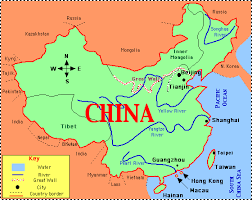
SUNSET STREET
China, 1983, 109 minutes, Colour.
Directed by Wang Ha Wei.
Sunset Street is a contemporary Chinese romantic drama. It is set in the city of Beijing (used in such films as Rickshaw Boy, Memories of Old Beijing). The material of the film is soap opera - the popular material of western television series. We are show an old street and its inhabitants, we see their way of life, their interactions, their problems. The old street is to be pulled down and all are to be transferred to a high-rise building. This happens.
It is interesting to note China using the straightforward methods of soap opera for its '80s film industry. They are also optimistic in the move towards the high apartment blocks. Great faith is expressed in the People's Republic. The film is accessible to western audiences who may find it rather romantic and simplistic. As soap opera, it is a pleasing
film and has an attractive visual style.
1. Indications of Chinese film-making in the '80s? For the home audience? Export?
2. Straightforward style, the locations of Beijing, colour photography? The feel for the old street, the city, the new apartment blocks? An attractive and romantic score?
3. The material of soap opera and romance? Comparisons with soap opera and televisions styles from western countries? Japan?
4. The straightforward presentation of characters and themes? Too simplistic? Evoking emotional response. patriotic? The upright nature of most of the characters? An attempt at edifying soap opera?
5. The presentation of old and new Beijing? The quaintness and attractiveness of the past, the enterprise of the future? optimism about the new office blocks, apartments, restaurants? The ability to make the transition? The Chinese spirit and faith in the Republic's administration?
6. The social perspective of the Chinese - the street, friendships. mutual help? The individuals seen within this context? Comparisons with western styles? The universalising of the world - the looks of the cities. trends. Clothing, recreations?
7. The universal soap opera themes? the old people, the old man and his flowers, transferring to the restaurant and preparing bean curd, the collaboration of friends? - the young man with the pigeons, the larrikin touch, rowdy, drinking, girlfriends, friends in the block, helping in difficulties? His parents? - the girl and Stony and their love, a nice girl, her obnoxious father. the plans for marrying her to the rich man from Hong Kong and leaving China. the attractiveness of Hong Kong and capitalist countries? Stony and his work on the radio, relationship with his mother. the shirts and the shop? Working at the restaurant? His ill father? The antagonism between the boy and the girl - hostility, resolution? - the teachers, the sense of family, the visits, the teaching of the adults to read. the cerebral haemorrhage, the ambulance and the hospital, moving? - the nurse and her illness, icy, afraid, in love with her suitor, the holiday, the gifts and the broken mirror, her finally accepting the man's attention? His constancy, fidelity, pursuit of the nurse? - the Hong Kong confidence tricksters and their style, the fights, the interrogation by the police?
8. How much insight into China of the '80s? Society, individuals, universal humanity?
Published in Movie Reviews
Published in
Movie Reviews
Tagged under
Saturday, 18 September 2021 19:20
Sunnyside
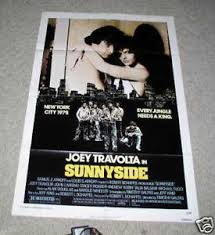
SUNNYSIDE
US, 1979, 100 minutes, Colour.
Joey Travolta.
Directed by Timothy Galfas.
Sunnyside is a minor contribution to the 'gang' film genre of 1979. Better examples were the excellent The Warriors and Walk Proud. other examples were Boulevard Nights and The Wanderers. This film has many derivative ingredients - but has the confidence of its convictions and presents them as if they were original. There is much verve and activity in the film. The cast is largely unknown but the main star is Joey Travolta. His appearance, manner and the disco-type opening of the film obviously exploit his brother John Travolta's star role in Saturday Night Fever.
However, Joey Travolta has a more gentle and restrained manner than his brother and can stand by himself. The film is certainly no masterpiece but, on its own small budget level, is quite an enjoyable and interesting example of a gang film. It is pessimistic in its tone and shows the futility of gang warfare and asks for people to face the causes, especially poverty, of gangs.
1. The trend in gang films of the late '70s? Their impact, the social background, the message? The films as being derivative of cliches about gangs, their composition, clashes and fights the background in such film as West Side Story? The presentation of violence exploitively or not?
2. New York city, its streets, ghettos, the people and their way of life, family joys, violence erupting, work and unemployment? The factories, the shops, the homes, the cafes? The drug dealing, robberies, exploitation? The film's colourful presentation of New York? The music and the use of songs? How authentic a presentation of the city - how contrived for the purposes of the film?
3. The brightness of the title and the opening song, the opening of the film? The lyrics? The gradual change to the darker side of the city and the dark ending?
4. The picture of gangs and interpretation of them - as always being part of the slum areas of cities? The types of men and women who are attracted to gangs? Their personalities, needing groups, being moulded by the ethos of the gang? The social phenomenon and its explanations? Individuality within the gangs -especially the leaders and the various types of leadership? The corporate personality of the gang, acting as one? The good bonds in a gang and the potential for good - as with Nick and his moves against exploitation e.g. with the carnival? The harmful aspects with domination, exploitation, violence? The power and dominance within the gang? Territory and domination, the inevitability of protection, clashes and warfare? Violence in bashings, death? Accidents? The role of the law and police? The codes of the gang and particular justice, vengeance? The inevitable sorrow from the violence?
5. The film's comment on '70s society, poverty and its forcing people on the street, jobs, boredom, the need to challenge energies? Ugly society? The picture of work, family life? Opportunities? The role of the police in this kind of society?
6. The opening and the introduction to Nick - the Travolta image? Disco, dance, swagger? Nick and his character with the group, his friendship and love for Donna, the visit to the carnival? The bonds with the gang? The potential for a hero?
7. Family life - Dennis at work and his art? The clashes and ridicule and joke? Billy and his study - and his comments at the table about killings? Donna and her place in this household? Mrs. Martin and her love for her sons?
8. The transition to Reaper Ed ~ in bed with the girl, the contrast with the Bible Group next door, his ridiculing of them? His leadership of his gang, his henchmen and violence? The love of violence, the lack of conscience, decisions to kill, the wreaking of vengeance? The ugly evil of the slums?
9. The build-up to the meeting of the gangs, the various groups arriving? The purpose of the meeting, the leadership exercised, the torch highlighting speakers, the clashes of personality? The plan and its social purpose? Nick and his hope for good? The build-up to the execution of the plan, the gangs converging on the carnival grounds, the machines? Money? The threatening guns, the real guns and the killings? The ugliness of Reaper Ed and the murders of the couple? The return of the group and the sharing of the money and its tensions?
10. Nick and his role in the gang - his influence, conscience? Donna and her pleading with him not to go in the gang? His love for Donna, romance, spending the night with her. the possibility of marriage? The continued encounters throughout the film? The discussion about pregnancy and the future, their final meeting and its ominous farewell? Nick and his love for his mother, the arrangement of the party? His reaction to the persecution of his gang, the torture and death of the members? Reg's death? The visit to the hospital? The resorting to guns? The surveillance of the gang, the plan for the blowing up of the building? His manner, politeness, being taken off by the police? His final release and the build-up to the ultimate confrontation? The inevitability of his death, the cause of grief, its futility?
11. The contrast with Dennis - shy. his art, his loving Nick and supporting him, Nick's trying to protect him, the encounter with Anne and his falling in love with her, the party and the sequence in the bathroom? His taking his mother to the apartment? The importance of the apartment for his future? His decision to help in the blowing up of the building? The final taxi ride and his presence at Nick's death?
12. The portraits of the rest of the gang - Harry and his, strutting, the ladies' man. his apartment and lending it to Nick, his cigarette dealing? Reg and his slowness. supervising the cigarettes, his self-defence, murder? The other members of the gang and their social background, varied racial backgrounds and the ridicule given them? The almost crucifixion of the gang member, his hospitalisation? The surveillance? Their blazing out in defence?
13. The trafficking in cigarettes, contacts, drugs? Reaper Ed and Des and the bashing of the car? Harry and Des and their deals?
14. The Warlocks in themselves. Reaper Ed and his influence, the killing of Reggie, the crucifying of the gang member, smashing Grogan's store, smashing the cake shop? Spies and the overhearing of the plan, the final confrontation?
15. Nick and his community attitudes and being mocked? His being trapped in his own world? Why?
16. The confrontation of the two gangs. the blazing out of violence, the picture of death?
17. The film as derivative, its energy and strengths? Its moralising points and its accurate and authentic picture of gangs - even though contrived for cinema purposes?
Published in Movie Reviews
Published in
Movie Reviews
Tagged under
Saturday, 18 September 2021 19:20
Sunflower
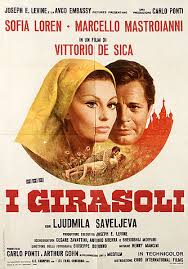
SUNFLOWER
Italy/Russia, 1970, 107 minutes, Colour.
Sophia Loren, Marcello Mastroianni, Ludmila Savelyeva.
Directed by Vittorio de Sica.
Sunflower - "in a world gone mad, a love story". Thus the advertising of the film. Critics and fans found this further step in the famous De. Sica-Loren-Mastroianni? combination ("Yesterday, Today and Tomorrow", "Marriage - Italian Style". etc.) very tame indeed. Sophia in tears, Marcello repentant and lovely photography in Russia, what one might have called in days gone by 'a woman's picture'.
1. The nature of war marriages, whether they are built on romances or reality, how lasting they can possibly be after almost-strangers are separated?
2. The nature of true love. what it really demands. especially if it is to be lasting?
3. The credibility of Antonio's behaviour in Russia, his willingness never to return to his wife and settle in Russia?
4. Whom did the film ask sympathy for - Antonio, his wife or his Russian wife?
5. The motive force of his wife's search for him?
6. Whether Sunflower was a satisfactory human film about real people and situations or whether it was merely a "Women's Weekly" romantic melodrama?
Published in Movie Reviews
Published in
Movie Reviews
Tagged under
Saturday, 18 September 2021 19:20
Sundown

SUNDOWN
US, 1941, 91 minutes, Black and white.
Gene Tierney, Bruce Cabot, George Sanders, Harry Carey. Joseph Calleia, Cedric Hardwicke, Carl Esmond, Reginald Gardiner.
Directed by Henry Hathaway.
Sundown is a rather exotic World War Two morale-boosting film. Gene Tierney is glamorous as an African girl, a wealthy trader, who is able to help the British. George Sanders and Bruce Cabot are the stiff-upper-lip heroes - and Sir Cedric Hardwicke as an Anglican bishop, as George Sanders' father, sermonises at the end to offer morale helps during the early days of the war. The plot is somewhat far-fetched, has all the elements of comic-book intrigue - and is fascinating in many ways because of this. There is a lavish Miklos Rosza score.
1. The value of the film as entertainment? Adventure? War propaganda and morale-boosting? Its impact in its time? How dated does it seem now?
2. The atmosphere of Africa, the desert, the exotic aspects of African tribes? World War Two in Africa? The British presence in Africa? The Germans? The credibility of the plot and the characters?
3. The atmosphere of the British Empire? The echoes of British Empire adventure stories? The tradition of the exotic action adventure? The techniques of 19th. century action stories into the 20th. century?
4. The opening with the focus on Zia, the plane, the African landscapes, her changing from western dress to African dress, the trader caravans and the lifestyle, the trade contacts. the empire of traders in Africa, trade posts and their use during the war? Zia and her circumstances? The mystery of her origin, of her operations? Her contact with Crawford. the severity of Major Coombes? Her seeming to betray the group? The villainy of the Dutch trader? Her being put in prison? Her vindication? The revelation of her identity and belonging to two worlds? The finale with the marriage and the sermon? The credibility of Gene Tierney in the central role?
5. The African outpost - echoes of Beau Geste and the Foreign Legion? Crawford and his style? Personal interest in his work? Hero? The clash with Major Coombes and the letter of the law? The passing through of information? Polini as prisoner, as helping? The spy? Principles? Tracking down Zia? Imprisonment? Escape? The final heroics?
6. Major Coombes and George Sanders' suave style? Man of principle, letter of the law, hard-headed? His suspicions? The clash with Crawford? Letter of the law with Polon! and his later relenting? His death?
7. The bishop and his sermon? Like father, like son? The sacrifice of his son? Propaganda and morale-boosting for the war?
8. The Germans in Africa, the traders and their cover, the trading outposts and the supplying of arms to the tribes? The suave Dutchman and his story? His betrayal? The killing of Polini? His death?
9. Polin! and the comic touch with the Italians and their siding with the British? His loyalty? His death? Dewey and his knowledge of the territory? His helping Crawford?
10. The background of African tribes, having weapons, their knowledge of the desert, war? The death of the carrier in battle? The grief of his wife -in the light of the marriage ceremony?
11. Boys' Own African adventure-style action in a war context? Themes of war, violence, romance, self-sacrifice? The idealism of the Boys' Own adventure?
Published in Movie Reviews
Published in
Movie Reviews
Tagged under
Saturday, 18 September 2021 19:20
Sunday Woman
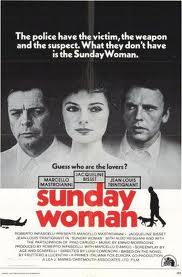
SUNDAY WOMAN
Italy, 1975, 100 minutes, Colour.
Marcello Mastroianni, Jacqueline Bissett, Jean-Louis? Trintignant.
Directed by Luigi Comencini.
Sunday Woman is an interesting and entertaining murder mystery, Italian style. Directed by Luigi Commencini, probably better noted for his comedies, the film has zest and pace. Marcello Mastroianni is effective as the police inspector, though he does not have to exert himself too much. Jean Louis Trintignant has a better role as a wealthy homosexual. Jacqueline Bisset is the leading lady - she settles down to the Italian style, though it is somewhat disconcerting to see her gesticulating so vigorously in the early sequences of the film.
The setting is Turin, there is eventually some social comment behind the unravelling of the murder mystery.
1. Interesting mystery? Characters? Situations?
2. Turin settings, the attractiveness of the city, the lifestyle of the wealthy? The effects for the murder sequences, the flashbacks? Ennio Morricone's musical score?
3. The title and the focus? Who was the Sunday Woman?
4. The focus on Inspector Santamaria, his assistant? Personal background, in the force, investigating the murder, the interviews with Massimo and Anna Carla? Pursuing Lello? Investigating the background of Garrone? Anna Carla's growing involvement? Her games, clues? The intervention of Senora Tarbusso, the raid on the brothel? The build-up of the investigations, the market sequence, the discovery of the truth and the confrontation with Senora Tarbusso? The finale with Anna Carla? Sketch of the police inspector?
5. The opening and the focus on Anna Carla, her relationship with her husband, the letter about Garrone? The servants and their speculations, reading her letter, going to the police? Her relationship with her husband and his infidelity? Her snobbery about Garrone, pronunciations etc. and taking part in Massimo’s games?. Friendship with Massimo, ringing him, getting him involved? Meeting the inspector, the meals, the discussions, phone calls, clues? Her relationship with her husband, suspecting him? The visit to the market, the finale? Her callous and amoral attitude towards the inspector at the end?
6. Massimo and his involvement, relationship with Anna Carla, his relationship with Lello, the influence of his mother? The emotional involvement with Lello, love, fights? The investigation, Garrone, the discussions with the inspector? The fight with Lello and his leaving? Alibis? The discussions about the raid, the visit to the market, the truth?
7. Lello and his relationship with Massimo, highly emotional, the sequences between them? His wanting to help Massimo, going to the Council, his investigations, to the sculptors? The truth and the inspector? His discovering the truth, the arrest, the interrogations? His death?
8. Garrone and the collage at the opening of his character, unsympathetic, his death? Architecture. cemeteries, his partner, sex, blackmail?
9. The sculptors and their instruments, their attitude towards the inspector and Anna Carla? Lello? Their involvement with Garrone?
10. Senora Tarbusso - and her story seeming an intrusion on the main plot? The hairdressers and the comments? Her sister? Her righteousness and getting the police to raid the brothel? Peace? The irony of her attitude towards Garrone and the blackmail, her vicious killing of him? Considering him a pig? Considering Lello a queer? Her not feeling guilty? Was her identity as the murderer expected?
11. Social comment, Italian situations? Human nature? Ingredients for a murder mystery?
Published in Movie Reviews
Published in
Movie Reviews
Tagged under